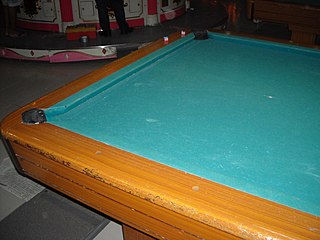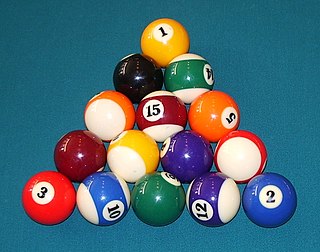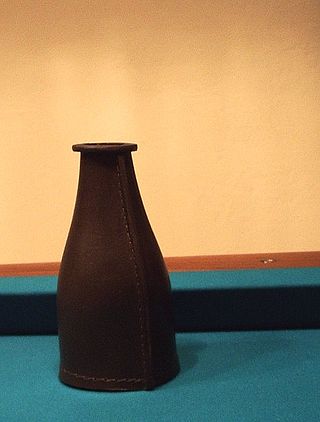Related Research Articles

Cue sports are a wide variety of games of skill played with a cue, which is used to strike billiard balls and thereby cause them to move around a cloth-covered table bounded by elastic bumpers known as cushions. Cue sports are also collectively referred to as billiards, though this term has more specific connotations in some varieties of English.

Eight-ball is a discipline of pool played on a billiard table with six pockets, cue sticks, and sixteen billiard balls. The object balls include seven solid-colored balls numbered 1 through 7, seven striped balls numbered 9 through 15, and the black 8 ball. After the balls are scattered with a break shot, a player is assigned either the group of solid or striped balls once they have legally pocketed a ball from that group. The object of the game is to legally pocket the 8-ball in a "called" pocket, which can only be done after all of the balls from a player's assigned group have been cleared from the table.

Nine-ball is a discipline of the cue sport pool. The game's origins are traceable to the 1920s in the United States. It is played on a rectangular billiard table with pockets at each of the four corners and in the middle of each long side. Using a cue stick, players must strike the white cue ball to pocket nine colored billiard balls, hitting them in ascending numerical order. An individual game is won by the player pocketing the 9-ball. Matches are usually played as a race to a set number of racks, with the player who reaches the set number winning the match.

Straight pool, which is also called 14.1 continuous and 14.1 rack, is a cue sport in which two competing players attempt to pocket as many object balls as possible without playing a foul. The game was the primary version of pool played in professional competition until it was superseded by faster-playing games like nine-ball and eight-ball in the 1980s.

One-pocket is a pool game. Only one pocket for each player is used in this game, unlike other games played on a pool table where any pocket can be used to score object balls. The object of the game is to score points. A point is made when a player pockets any object ball into their designated pocket. The winner is the first to score an agreed-upon number of points.
Golf billiards is a pocket billiards game usually played for money. Unlike the majority of such games, it allows more than two people to play without compromises or rule changes. The game borrows from the outdoor game of golf, which is historically related to the cue sports. It is usually played on 10-foot or 12-foot snooker tables as their size and structure are more appropriate. In 2006 the Billiard Congress of America commented it was more popular than snooker in the United States.
Cutthroat or cut-throat, also sometimes referred to as three-man-screw, is a typically three-player or team pocket billiards game, played on a pool table, with a full standard set of pool balls ; the game cannot be played with three or more players with an unnumbered reds-and-yellows ball set, as used in blackball. Each player is commonly assigned a set of five consecutively numbered object balls, though the number of balls will vary by number of players. The object of the game is to be the last player with at least one ball of their group remaining on the table.

Russian pyramid, also known as Russian billiards, is a form of billiards played on a large billiard table with narrow pockets. It is played across Russia and several former Soviet/Eastern Bloc countries. In the West, the game is known as pyramid billiards, or simply pyramid.

Pool is the name given to a series of cue sports played on a billiard table. The table has six pockets along the rails, into which balls are shot. Of the many different pool games, the most popular include: eight-ball, blackball, nine-ball, ten-ball, seven-ball, straight pool, one-pocket, and bank pool. Eight-ball is the most frequently played discipline of pool, and it is often thought of as synonymous with "pool".

Ten-ball is a rotation pool game similar to nine-ball, but using ten balls instead of nine, and with the 10 ball instead of the 9 as the "money ball".

A rack is a piece of equipment that is used to place billiard balls in their starting positions at the beginning of a pocket billiards game. Rack may also be used as a verb to describe the act of setting billiard balls in their starting positions, or as a noun to describe a set of balls that are in their starting positions.
The following is a glossary of traditional English-language terms used in the three overarching cue sports disciplines: carom billiards referring to the various carom games played on a billiard table without pockets; pool, which denotes a host of games played on a table with six pockets; and snooker, played on a large pocket table, and which has a sport culture unto itself distinct from pool. There are also games such as English billiards that include aspects of multiple disciplines.

Rotation, sometimes called rotation pool, 15-ball rotation, or 61, is a pool game, played with a pocketed billiards table, cue ball, and triangular rack of fifteen billiard balls, in which the lowest-numbered object ball on the table must be always struck by the cue ball first, to attempt to pocket numbered balls for points.

Three-ball is a folk game of pool played with any three standard pool object balls and cue ball. The game is frequently gambled upon. The goal is to pocket the three object balls in as few shots as possible. The game involves a somewhat more significant amount of luck than either nine-ball or eight-ball, because of the disproportionate value of pocketing balls on the break shot and increased difficulty of doing so. In some areas and subcultures, such as the Asian-American youth-dominated pool hall scene of San Francisco, California, three-ball is a popular local tournament game.
Honolulu, also known as banks, kisses, and combinations or indirect, is a pocket billiards game. Players must pocket all shots in an indirect fashion to reach a set number of points. The game shares some similarities with other cue sports, played on tables and with balls used for pool, but differs with foul points being awarded for regular direct shots.

Kelly pool is a pool game played on a standard pool table using a standard set of 16 pool balls. Gameplay involves players each drawing one of 16 numbered markers called peas or pills at random from a shake bottle, which assigns to them the correspondingly numbered pool ball, kept secret from their opponents, but which they must pocket to win the game. Kelly pool is a rotation game, which means that players must contact the lowest numbered object ball on each shot first until the opportunity to pocket their own is presented. If a player draws the number 16, this player is assigned the cue ball. In order to pocket the cue ball, the player must contact the lowest ball first and in the same shot, pocket the cue ball. However, the game is commonly played by removing the pea numbered 16 and playing with the basic 15 numbered balls and corresponding peas. Two rule variants are set forth under rules promulgated by the Billiard Congress of America (BCA). In the simpler form, the object of play starts and ends with the goal of pocketing one's secret ball. In the second, in addition to the goal of pocketing one's secret ball, points are scored in various ways. In the instance where pills are unavailable, a cloth may be used to cover the balls, which are then chosen blindly, recorded, and replaced for play.

Baseball pocket billiards or baseball pool is a pocket billiards (pool) that is loosely based on the game of baseball. The game is played on a standard pool table and suitable for multiple players. In baseball pocket billiards, many of the game's features are named after baseball terms, such as the 9 ball being named the "pitcher", the table's foot spot is "home plate", and each team or player is afforded "nine innings" to score as many "runs" as possible.

Bottle pool, also known as bottle-billiards and bottle pocket billiards, is a hybrid billiards game combining aspects of both carom billiards and pocket billiards. Played on a standard pool table, the game uses just two object balls, a cue ball, and a 6+3⁄4 inches (170 mm) tall, narrow-necked bottle called a shake bottle or tally bottle, traditionally made from leather, that is placed on the table and used as a target for caroms. Those unfamiliar with the game sometimes mistakenly use its name as a synonym for the very different game of kelly pool. Bottle pool has been described as combining "elements of billiards, straight pool and chess under a set of rules that lavishly rewards strategic shot making and punishes mistakes with Sisyphean point reversals."

Cribbage, sometimes called cribbage pool, fifteen points and pair pool, is a two-player pool game that, like its namesake card game, has a scoring system which awards points for pairing groups of balls that total 15. Played on a standard pool table, participants who pocket a ball of a particular number are required to immediately pocket the companion ball that tallies to 15 when added to the prior ball's number. Each pair so pocketed counts as a cribbage; there are seven such pairs, and the 15 ball counts as an eighth by itself after all of the others have been pocketed. The first player to score five cribbages wins the game.
Carom billiards and pool are two types of cue sports or billiards-family games, which as a general class are played with a stick called a cue which is used to strike billiard balls, moving them around a cloth-covered billiard table bounded by rubber cushions attached to the confining rails of the table.
References
- ↑ Phelan, J.J. (1919). Pool, Billards and Bowling Alleys as a Phase of Commercialized Amusements in Toledo, Ohio. Social survey series 1, March. Little Book Press. p. 30.
- ↑ Michael Ian Shamos (2002). The New Illustrated Encyclopedia of Billiards. Lyons Press. p. 51. ISBN 978-1-58574-685-9.
- ↑ William Brisbane Dick; Edmond Hoyle (1921). The American Hoyle: Or, Gentleman's Hand-book of Games, Containing All the Games Played in the United States, with Rules, Descriptions, and Technicalities Adapted to the American Method of Playing. Fitzgerald Publishing Corporation. pp. 476–477.
- ↑ A History and Description of Billiard Its Sanitary Advantages: With Instruction how to Play the Game, and All Rules Relating to Billiards and Pool. p. 61.
- ↑ A Complete Hand-book of Standard Rules of all the prominent games of Billiards and Pool Archived 2016-03-04 at the Wayback Machine , (1910) New York: The Brunswick-Balke-Collender Company p.71.
- ↑ Wertheim, L.J. (2008). Running the Table: The Legend of Kid Delicious, the Last Great American Pool Hustler. Houghton Mifflin. pp. 17–18. ISBN 978-0-547-08612-5 . Retrieved February 17, 2016.
